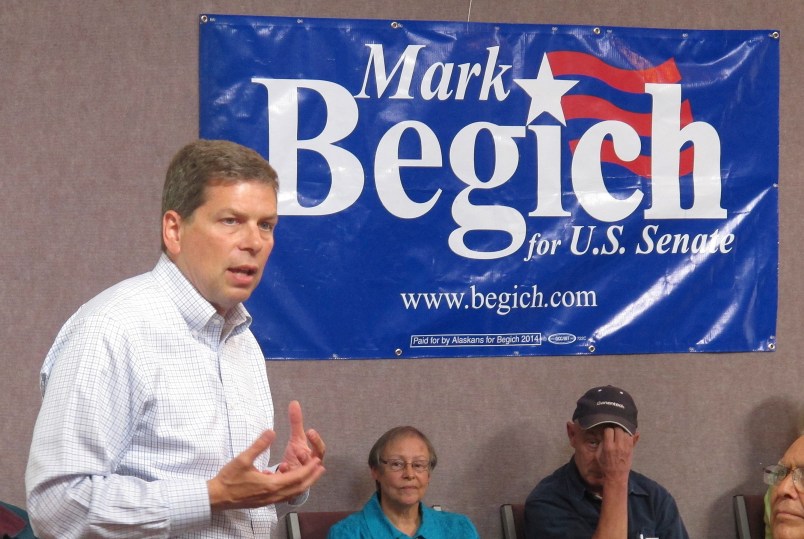Everybody, even Republicans, seems to agree that Obamacare is not the electoral juggernaut it was supposed to be heading into the final weeks of the 2014 campaign. It still makes its obligatory appearances in stump speeches and debates, as well as some passing references in television ads, but the law has undoubtedly faded as other issues command the national debate.
But the last week suggests that Obamacare might still have a little life as a campaign issue in the Alaska Senate race — meaning it could still play a role in swinging control of the Senate. The problem for incumbent Sen. Mark Begich (D-AK) is that while Republican doomsaying about skyrocketing 2015 premiums has been hugely overstated for the most part, Alaska is actually facing much higher premiums that make for easy attack ads. And big-money outside groups are seizing on it as they back Republican challenger Dan Sullivan.
The state insurance division said last month that Obamacare premiums would increase by more than 30 percent on average next year, according to Alaska Public Media. A number of things could account for that — maybe the insurance companies just made bad projections in 2014 — but Alaska does have a limited market (two issuers) and a very small one (12,900 people enrolled in 2014) that would help explain the surging prices.
“I don’t think there are any areas where the major insurers are all increasing rates this substantially,” Larry Levitt, vice president at the non-partisan Kaiser Family Foundation, told the news outlet. He confirmed to TPM this week that Alaska looked like it would face the highest premium increases in the country, based on publicly available data. “In a market with very few people like Alaska, it is possible that a few people with expensive illnesses could skew the risk pool substantially,” he said in an email.
Now there are a lot of caveats. Most people should be shielded from the increases because Obamacare’s tax subsidies cover most of the difference, and if the insurers aren’t justified in raising their rates that much, the law allows the government to bring them down.
But that’s a lot of nuance when campaign TV spots last 30 seconds, and Republicans know it. American Crossroads reported a $927,000 TV ad buy this week, according to the Federal Election Commission, and released a new spot that highlights the more-than-30 percent premium increase on its way.
“Yeah, I don’t think it’s helpful,” one Democratic operative on the ground in Alaska, who requested anonymity to speak candidly, told TPM of the rising premiums. But the operative contended that because the impact was so limited (less than 13,000 enrollees in a state of 900,000) and because Obamacare has been driven into the ground as a campaign issue that the American Crossroads attack wouldn’t do any great damage to Begich.
“If Obamacare was the thing that was going to swing an undecided to Sullivan, away from Begich, that would have happened four or five years ago,” the source said. “It’s not a particularly great line of attack for undecided voters.”
But Begich is still making the effort to respond, putting out a radio ad that acknowledges frustrations with Obamacare while emphasizing his proposals to fix it. Those include giving insurers the ability to offer a cheaper health plan than is currently allowed under the law.
“To me this is a critical core issue for Alaskans. When I think about the health care law, frustrated, disappointed, you can put a lot of words towards it,” Begich says in the minute-long ad. “But everyday I work to try to fix it because the way Alaskans operate, we come together to learn how to solve the problems and move forward.”
The real effect of the GOP’s continued attacks on Begich over Obamacare is that it ties him to the unpopular national Democratic brand, University of Alaska-Fairbanks political scientist James Muller told TPM. Begich has so far focused his entire campaign around Alaska-centric issues and built a reportedly stellar ground game to turn out voters. The best way for the GOP to counter then is to continue linking Begich with the White House through Obamacare, Muller said. Begich has a solid record in Alaskan eyes on crucial issues like oil and energy, Muller said, so the health care law is one high-profile vote on which Republicans can try to hammer him.
“I think that’s what they’re trying to do, and I think it has resonance with a lot of voters,” he said. “Begich has voted the way Alaskans want him to vote on those (oil and gas) issues because he has to. But here, he actually cast a vote in favor of it.”
At the moment, Sullivan holds the advantage, 46.6 percent to 41.8 percent, according to TPM’s PollTracker average.







Alaskans need to get out and vote for an increase in the minimum wage and a new Governor who will not turn away Medicare funds for those who fall through the ACA crack. Republican Governor Parnell can be thanked for all the problems caused by Obamacare in Alaska. President Obama and Senator Begich should be thanked by all those twenty-somethings who are now covered on their parents’ health insurance.